 (Image of Hurricane Harvey is from NASA.)
(Image of Hurricane Harvey is from NASA.)Global warming (i.e., global climate change) did not create Hurricane Harvey. But did it make that hurricane worse? Yes, according to scientists. Consider this article by Sara Peach at Yale Climate Connections:
If Hurricane Harvey is unprecedented, does that mean it was caused by climate change? Not quite: After all, it’s normal for hurricanes to form during hurricane season. But climate change could have played a role in worsening the storm. Here’s why. As Kevin Trenberth, a scientist at the National Center for Atmospheric Research, explains in this video, the rise in Earth’s temperature now serves as the background for weather. “The environment in which all events occur these days is different, so in fact every storm is different, every event is actually different. It has to be,” Trenberth says. “The air, being warmer, means it can also hold more moisture. There’s more moisture in the air, especially coming off of the oceans.” That extra moisture matters, adds climate scientist Katharine Hayhoe of Texas Tech: “So when that storm comes along, as it always does, there’s more water vapor sitting up there for that storm to pick up and dump on us.” arm water is fuel for hurricanes. In fact, Harvey had weakened to a tropical depression as it crossed the Yucatan Peninsula days before it made landfall in Texas. But then it hit the unusually hot waters of the Gulf of Mexico and quickly reorganized into a powerful hurricane. As scientist James Elsner of Florida State University explained to YCC in 2016, “With warmer oceans caused by global warming, we can expect the strongest storms to get stronger.” When a hurricane makes landfall, its winds push seawater ashore, creating a dangerous storm surge. Adding sea-level rise to storm surge can make that flooding even worse than it was in the past. In places like Miami, flooded streets and houses now flood routinely, even in the absence of a hurricane. “The water is here. It’s not that I’m talking about some sci-fi movie here. No. I live it. I see it, it’s tangible,” South Beach resident Valerie Navarrete told YCC in February 2017. She said her garage floods about once every other month, and she often has to wear rain boots just to get to her car. As sea levels continue to rise, low-lying coastal areas will grow even more vulnerable to hurricanes. . . . Climate scientists are sure to study Harvey closely for many years to come. But climate scientist Michael Mann at Penn State University has already offered an initial assessment in The Guardian: “We cannot say climate change ’caused’ Hurricane Harvey (that is an ill-posed question), we can say is that it exacerbated several characteristics of the storm in a way that greatly increased the risk of damage and loss of life,” he wrote. “Climate change worsened the impact of Hurricane Harvey.”

